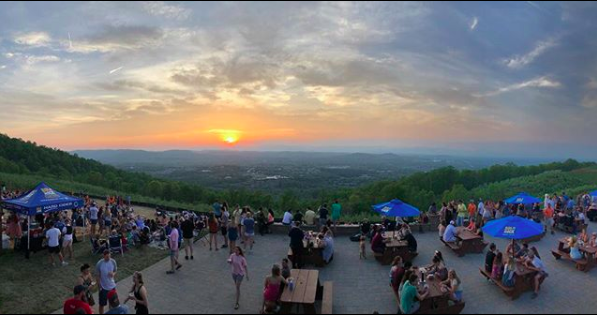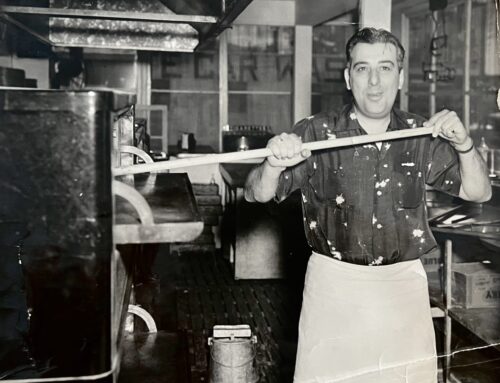By Dave Infante
You could mistake the view from Bold Rock for a Bob Ross painting, if not for the people strolling through the landscape with alcoholic beverages in hand. Kick back in an Adirondack chair with a Virginia Draft (made with apples sourced within 35 miles of where you’re sitting) with the soaring foothills of the Blue Ridge Mountains before you, and it’s easy to see why Bold Rock is the largest independently owned craft cidery in the U.S.
“The land is our brand,” Bold Rock owner John Washburn tells me. “It’s just ethereal up here.” In 2012, Washburn co-founded the cidery right here on 50 acres of central Virginia’s Rockfish Valley with visions of an alpine alcohol paradise. And he was hardly alone.
Bold Rock is part of “Alcohol Alley,” a local nickname for the stretch of Route 151 that cuts through the northeastern edge of George Washington & Jefferson National Forest on or near which dozens of breweries, wineries, cideries, and distilleries have sprung up in recent years. There are now 19 booze making outfits in Nelson County. By comparison, Fairfax County (the state’s most populous, just outside of Washington DC), has over a million more residents, but fewer producers. According to Nelson County’s office of economic development & tourism, the alcohol beverage industry employs 425 locals directly, and helped power almost $200 million in tourism expenditures in the county in 2016 (the most recent year for which data is available).
“It’s an unbelievable phenomenon. You wonder how in the world such a rural area” became such a hotbed for booze making and broader agri-tourism. “Dominion didn’t give a hoot.”
“It’s an unbelievable phenomenon. You wonder how in the world such a rural area” became such a hotbed for booze making and broader agri-tourism, crows Washburn. “Dominion didn’t give a hoot.”
That would be Dominion Energy, a Richmond-based power & utility company that serves more than 5 million retail customers throughout the Southeast and Midwest. Along with regional partners, it is spearheading the Atlantic Coast Pipeline: a 42”-diameter, 600-mile-long, $6-billion natural gas conduit that it claims is needed to serve increasing natural gas demand throughout the region. (Dominion’s spokesperson for the ACP, Aaron Ruby, did not respond to multiple requests to be interviewed for this story.) In the middle of the ACP’s proposed path from West Virginia shale to North Carolina power plants sits Alcohol Alley.
The ACP project was first proposed in 2014, and the argument has been raging in Nelson County ever since. Of course, the viability of the area’s emergent alcohol industry is hardly the gravest concern of pipeline critics; there’s general public health and environmental preservation to worry about. Many in Nelson County’s booze economy share those priorities — not just as worried residents, but as employees and small-business owners whose products and premises represent even more skin in the game.
***
Whether it’s a glass of estate Chardonnay on the grounds of Afton Mountain Winery or a Full Nelson IPA on Blue Mountain Brewery’s sprawling patio, the breathtaking Shenandoah views are a common ingredient in the region’s various alcoholic beverages. Terrific views sell booze, and many of Nelson County’s producers have capitalized on the landscape to power on-site appeal at their facilities. Virginia doesn’t track tap room & tasting room sales volumes across categories of alcoholic beverage, and besides, it’d be impossible to extrapolate how much of that revenue was directly due to the scenery. But on-site sales are a crucial source of revenue for small alcohol producers across the country, and the ACP’s impending construction in the Rockfish Valley may threaten that.

Nelson County residents protesting the Atlantic Coast Pipeline. Photo via of Friends of Nelson Facebook page.
“Anything that tarnishes or ruptures the land will eventually tarnish our brand,” says Washburn, who trademarked the slogan “drink in the scenery” after opening the Bold Rock cidery and seeing firsthand the marketing draw of its vistas. Like other Alcohol Alley producers, he worries how the “stripe of deforestation” caused by the pipeline’s 125-foot right-of-way will affect the cidery’s on-site business. “It won’t be positive,” he guesses.
In promotional literature, the ACP has insisted that the landscape will not be meaningfully disrupted. A video published to its YouTube channel in March of last year featured a female narrator asserting that “the natural gas transported by this project will be as invisible as the current 300,000 miles of underground natural gas pipelines in operation today.”
Like other Alcohol Alley producers, Bold Rock co-owner John Washburn worries how the “stripe of deforestation” caused by the pipeline’s 125-foot right-of-way will affect his cidery’s on-site business.
But some business owners who serve Nelson County’s booze-seeking visitors, like Jon Craig, co-owner of Charlottesville tour company Cville Hop On, remain unconvinced. “That’s why people are coming out,” he says. “Not just for the beers, cider, spirits, and everything else. It’s the beauty. It’s been a force looming [to know] that there’s going to be this big nasty scar right through the area.”
Founded in 2016, the company operates five buses in the area, and had planned to expand to 10 by the end of 2018. Cville Hop On tours are currently sold out for months in advance, says Craig, but with the fate of Alcohol Alley’s postcard-perfect scenery still unknown, “it’s wait and see at this point” on how he and his partner grow the business.
“I’m crossing our fingers that it’s not an eyesore,” says Washburn. Maybe Dominion’s video is to be believed, and the ACP will hardly be noticeable from Alcohol Alley’s primo outdoor drinking spots. Then again, there’s always the water to worry about.
***
When Christine Riggleman was looking for a place to distill, she didn’t have to look much farther than her own property. “She was just really happy with the water quality there,” says Abby Riggleman, Christine’s daughter. “I think it was the limestone.” Christine and Abby both work at Silverback Distillery in Afton, VA, where the elder Riggleman is master distiller.
Since opening in 2014, Silverback has won awards for its liquors at the hotly contended San Francisco World Spirits Competition, and earned praise for its efforts to pioneer green distilling with geothermal technology and energy-efficient boilers. But as the ACP lumbers closer to reality, the groundwater that goes into those boilers to help win those awards has become a potential liability.
“We’re concerned that [Dominion] has not done all the testing they should be doing in order to best protect groundwater from the risks of pipeline construction,” says Amy Mall, a senior policy analyst at the National Resource Defense Council, an environmental advocacy group. The NRDC and other groups have pointed to unique regional factors like steep-slope erosion, occasional seismic activity, and karstland (an interconnected underground topography of limestone through which water can pass great distances and intermingle with other sources) as factors that demand additional scrutiny. A Virginia cave specialist called the ACP’s route through karstlands a “prescription for disaster” for groundwater security in a 2016 report.
Brewers, vintners, and distillers in Nelson County — most of whom rely on groundwater to produce their libations — say these factors make the ACP a threat to their booze making. “We handpicked Nelson County for that pure water and now Dominion threatens to ruin it,” laments Todd Rath, owner of Blue Toad Cidery in Roseland, VA.
“We handpicked Nelson County for that pure water and now Dominion threatens to ruin it.”
Josh Pratt, owner of BrewRidge Tours, a touring company that serves the area from its base in Lynchburg, VA, says that “good water” is everything for Alcohol Alley. “For example, [at] Devils Backbone,” he says, “part of the reason their beer is so fantastic is because of that springwater right there in the Rockfish Valley. You don’t have good water, you’re pulling up stakes and going somewhere else, or going out of business.”
Harder to quantify (but no less comforting to the area’s producers) is the perception of contamination. “What happens if someone comes in and says ‘we don’t want to buy this product because we’re afraid?’” poses Denver Riggleman, Christine’s husband, in Won’t Pipe Down, a 2015 documentary on the ACP produced by his daughter, Abby. In other words: In a state with approximately 200 breweries, 300 wineries, and 45 distilleries, customers could opt to drink elsewhere, even if the pipeline never actually affected the Rockfish Valley’s groundwater.
(Several Alcohol Alley booze makers contacted for this story shared this perspective with me on the condition it wouldn’t be attributed to them, for fear of inadvertently associating their product with the specter of water contamination in press coverage.)
Pratt of BrewRidge Tours, who considers himself “in the middle” of the debate surrounding the ACP, points to the Federal Energy Regulatory Commision & Army Corps of Engineer approvals as evidence that the contention over the project is overblown. Still, he admits, his business can conduct tours in other regions, so he doesn’t have as much to worry about as the brick-and-mortar owners of Nelson County, who fear that their customers may decide that what could happen isn’t worth the risk, and do their drinking elsewhere. “It’s more a concern about what could happen than what might actually happen,” he says.
***
Anchored as it is by a farmhouse-cum-cabin that overlooks the valley, it’s no surprise that Bold Rock earned a nod from USAToday as “maybe the most scenic place in America to drink cider” in 2017. Washburn, its founder, was delighted by the accolade. “But life has its surprises sometimes,” he says, chuckling darkly, explaining that the pipeline’s route through his farm will “wipe out” its current entrance. The impending construction, he says, has already scotched his plan to develop a portion of the property as a wedding venue (a popular way for alcohol producers in the area to diversify their revenue sources). He worries that construction traffic on Route 151 will interfere with distributors picking up “truckloads of hard cider every day.”

The view from the Bold Rock cidery. Photo via @boldrockhardcider/Instagram.
“Anything that tarnishes or ruptures the land will eventually tarnish our brand.”
Across Nelson County, booze makers are bracing for drastic effects on their properties and products. Blue Toad’s Rath predicts that the ACP “will hurt business, plain and simple.” For Silverback Distillery, the uncertainty has forced something of an existential reckoning. “A couple months ago, my dad asked my mom, ‘What do you love more: the business or our property?’” recounts Abby Riggleman. “‘Because if you love the property more, we have to sell the business, and if you love the business more, we might have to sell the property.’”
She’s speaking on the phone from York, Pennsylvania, where Silverback is planning to open a second location in the coming months. There aren’t any mountains in York, 250 miles north of Silverback’s original location, which they plan to continue operating in tandem with the forthcoming Pennsylvania location. She says that the expansion was always planned, but the pipeline (coupled with Virginia’s byzantine liquor laws, against which her father mounted a longshot “whiskey rebellion” gubernatorial run in 2017) hastened the move. “We’re not giving up on Virginia, but it’s been so hard,” she says.
Alcohol Alley shows no signs of giving up, either. Cruise the Rockfish Valley Highway past Silverback’s current location in Afton and you’ll see plenty of “NO PIPELINE” signs propped against hay bales and barn doors.
In our first email exchange, John Washburn concluded with something that caught me off-guard. It’s the Serenity Prayer, known the world over as the kick-off credo to Alcoholics Anonymous meetings. “Give me the serenity to accept what I cannot change, the courage to change what I can, and the wisdom to know the difference,” he wrote. It seemed incongruous, the owner of a hard cider company invoking a prayer about getting sober. But Washburn is living the prayer: He plans to build a personal home on a parcel of Bold Rock’s Nellysford property, pipeline be damned. Whether that’s acceptance, courage, or wisdom remains to be seen.
Belt Magazine is a 501(c)(3) nonprofit organization. To support more independent writing and journalism made by and for the people of the Rust Belt, make a donation to Belt Magazine, or become a member starting at just $5 a month.
Banner photo: Christine and Abby Riggleman of Silverback Distillery. Photo courtesy of Silverback Distillery.
Follow Dave Infante @dinfontay.






